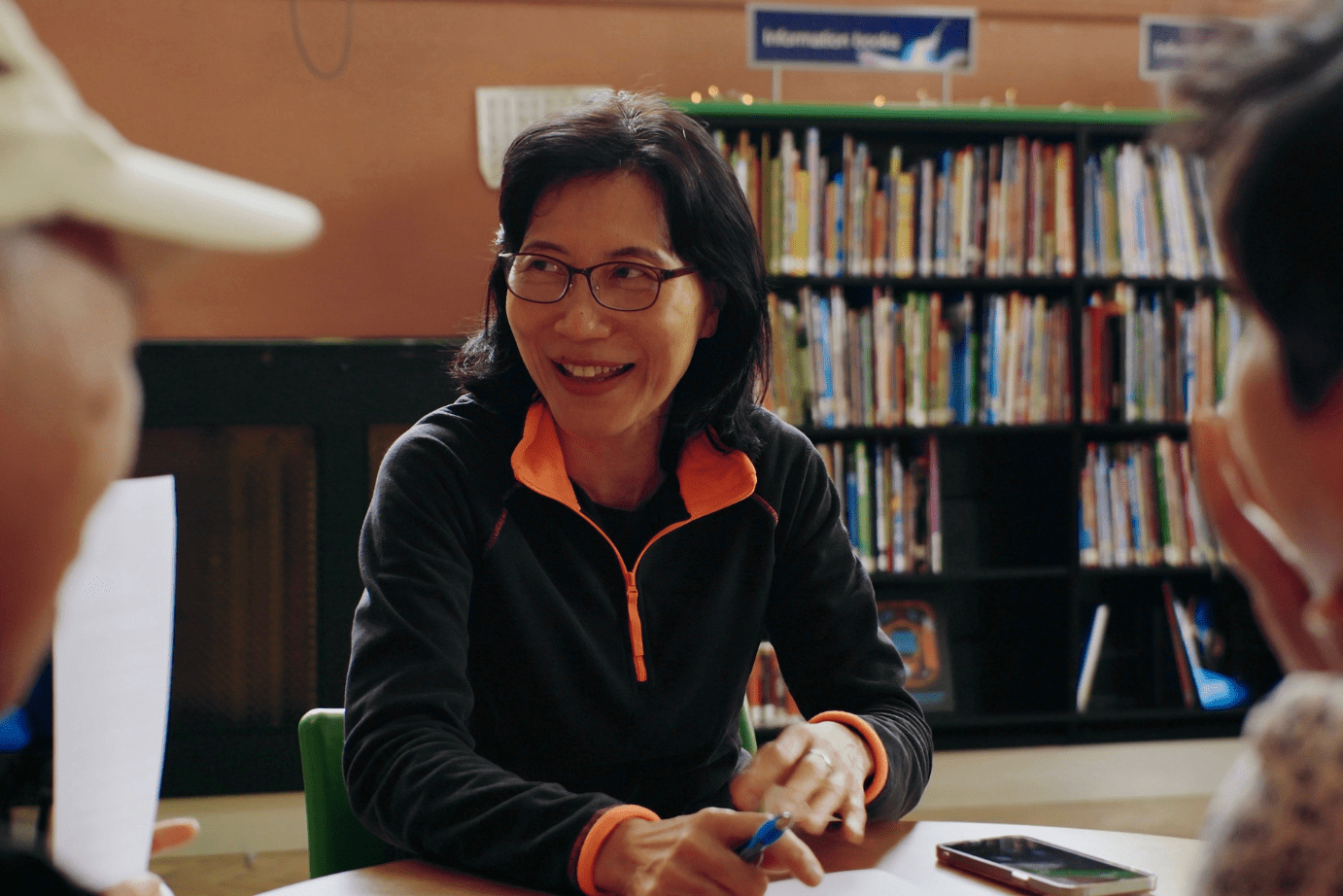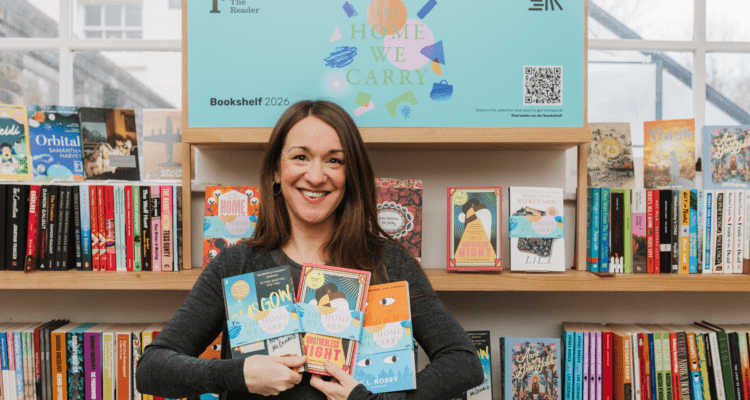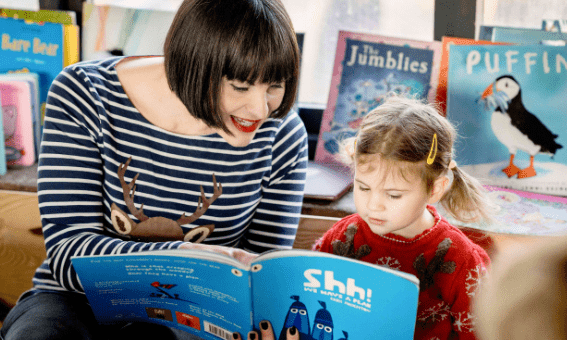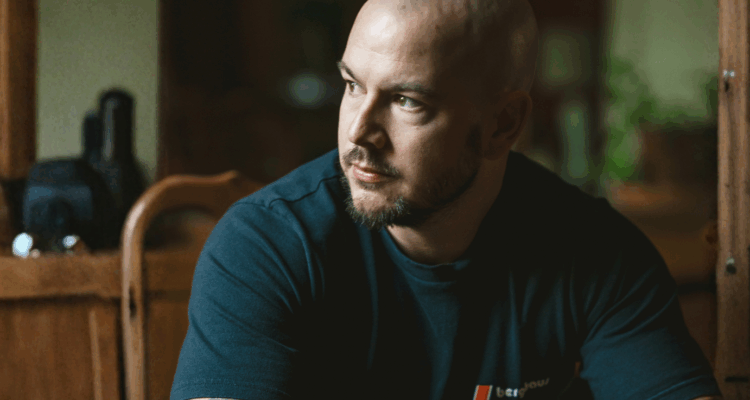Jane: ‘Shared Reading with asylum seekers is a weekly reminder of our lucky chance of being born in a safe country’
Retired teacher Jane has been leading a highly successful ESOL Shared Reading group for speakers of other languages in Skelmersdale, Lancashire, for six years, along with two co-leaders. Each week, The Reader brings people together at Shared Reading groups across the UK. These groups are free, and for everyone.

Can you tell us about the make-up of your Shared Reading group and how this has changed over the last few years?
Numbers vary from 10 to 25 people, mostly young men. Two years ago we had more Ukrainian men and women. Now some of those have returned to Ukraine or started work here so they no longer attend. We currently have several languages spoken including Kurdish Kurmanji, Kurdish Sorani, Farsi, Arabic, Tigrinya (Eritrea) Amharic (Ethiopia), and Somali. The asylum-seeker community is a transient one. It’s rare to have a group member for more than 18 months.
At Shared Reading groups, a trained Reader Leader selects stories and poems to read aloud together. Everyone is welcome to share how the words make them feel, as well as their thoughts, ideas and memories. What do you think is special about your group and the experience of ESOL Shared Reading?
At the start everyone introduces themselves and we welcome each person by name. We explain that we are an informal group, and they can just listen, or join in if they like. Although people may be from countries which are at war with each other, we describe ourselves as friends and thank each person who reads and contributes. We listen very closely and actively. We model respect, equality and kindness, the wonderful principles of The Reader.
Our ESOL Shared Reading group is a safe space where individuals feel welcome and included. The focus is always on the text and the topic, rather than directly on the person who may have a troubling background. We do not ask any prying questions - we just greet them warmly and are pleased to see them. The best sessions are those where the topic allows the group members to teach us something about their culture or their country.
Everyone experiences what is read in their own way, but the shared language found in literature can help us to understand ourselves – and others – better. How would you describe the effectiveness of poetry/literature as a language-learning tool?
Poetry is an excellent language learning tool as it comes with a ready-made context. We have had some really quite deep philosophical conversations in broken English in response to some poems. For example, Pruning Trees by Po Chu-i led to a discussion about accepting change, and the losses and gains that come with change. Quite pertinent to their experience of course.
What do you and your co-leaders most enjoy about leading this group and what drives you to continue?
It is a weekly reminder of our lucky chance of being born in a safe country with comparative wealth. I could just have easily been born in Afghanistan or Sudan. I can’t solve the injustices in the world, but I can give my time which might make a difference to someone’s lonely and difficult experience in the UK. I consider it my obligation, as a person of privilege, to share my resources. I enjoy meeting people from other countries.
How is the current political climate of right-wing, anti-immigration protests and national UK national flag hoisting, affecting your group members - many of whom may be fleeing wars, grave dangers or persecution?
We make an effort to counter those attitudes with a positive message of kindness and acceptance. One week I read Looking from a Different Angle by Paula Cleary (see below). Everyone in Britain is descended from people who travelled to this island from another country.
I try to include opportunities to learn about British history, geography and cultural heritage
The group members find these aspects very interesting. We read an abridged version of Oliver Twist and learnt about the Industrial Revolution and life in Victorian England. We prepared for a live performance of Much Ado About Nothing at the open-air theatre at The Reader’s home in Liverpool, by learning about Shakespeare’s life and theatre. In the future we hope our group members will take the British citizenship exam which has lots of questions about these topics.
What do you feel are the benefits of reading aloud in terms of community cohesion?
Reading aloud together is a shared experience. Everyone in the room shares the feeling and the reaction to the poem or stor It therefore unifies the group. I usually read the text first, then volunteers read sections, and we discuss, then we finish by reading together as a group, which is my favourite part. There is no pressure for anyone to talk or read aloud. Therefore, in terms of ESOL, they have heard the text at least three times and practised saying it individually as well as together which helps their pronunciation.
Over the last six years as a Reader Leader of this group have you been particularly affected or moved by the journey of any individuals and the progress they have made?
Many people, but there was a Ukrainian woman who was here alone without any family or friends. She absolutely loved attending our group and was very enthusiastic about poetry and Shared Reading. She moved to Liverpool earlier in the year and trained as a Reader Leader. She now has a paid job in Liverpool and came to The Reader’s home at The Mansion House in Calderstones Park before the performance of Much Ado About Nothing to meet us in the garden and say ‘Hello’.
What makes you feel most proud?
I feel pleased when I see the group members laughing and smiling or leaving the group chatting to someone from another country.
What poems work well with the group?
I am at pains to choose a poem or story which is uplifting and thought-provoking, as well as being written in accessible English. Topics such as language learning, hope, new experiences, connection, nature, kindness etc work well. I avoid topics such as family bonds, bereavement, war and sadness. Favourite poems include The Door by Miroslav Holub; Portable Paradise by Roger Robinson; Signify by Mike Garry and Everything Touches by Roger McGough.
Which texts by international writers have you and the group enjoyed reading and are there any stand-out recommendations by group members?
I have some copies of Modern Poetry in Translation and have occasionally used writers featured there. I once used a translation of a poem by Shevchenko who is a revered poet in Ukraine. It brought our Ukrainian friends to tears. Our Persian friends love Rumi and Hafez. Many Iranian homes have beautifully illustrated books of poetry on their coffee table.
I shared Emily Dickinson’s Hope is the Thing with Feathers and we asked each group member to translate it into their own language. It was lovely to hear them read it aloud.
Jane’s top ESOL poetry pick:
Looking from a Different Angle by Paula Cleary
'I live in the land that was
Shaped by thousands of generations of
Fortune hunters
Treasure seekers
Wanderers and sailors'
As a charity we rely on the generous support of individuals and organisations to help us change lives through Shared Reading. A donation allows us to train volunteers, provide resources for groups and help reach more people with Shared Reading. We want to make sure everyone can attend a Shared Reading group, no matter their background, income or situation, and we'll be so grateful for your help.
Share
Related Articles

The Reader unveils new Bookshelf for 2026
The UK’s biggest Shared Reading charity today launches its 6th annual Reader Bookshelf - a carefully curated collection of stories, plays, and poems - at the start of the…

The Reader launches Christmas appeal to raise £10,000 to help care-experienced children thrive through the joy of reading
As the festive season approaches, the Liverpool-based national Shared Reading charity is launching an appeal calling for help to make…

Meet Anton Clarke, Director of Social Enterprises
‘The Reader has made a meaningful difference to the lives of many people’ Director of Social Enterprises Anton Clarke looks…


